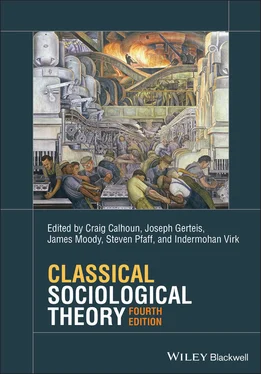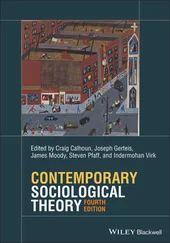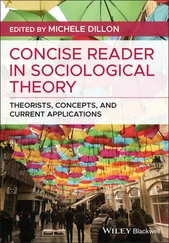Classical Sociological Theory
Здесь есть возможность читать онлайн «Classical Sociological Theory» — ознакомительный отрывок электронной книги совершенно бесплатно, а после прочтения отрывка купить полную версию. В некоторых случаях можно слушать аудио, скачать через торрент в формате fb2 и присутствует краткое содержание. Жанр: unrecognised, на английском языке. Описание произведения, (предисловие) а так же отзывы посетителей доступны на портале библиотеки ЛибКат.
- Название:Classical Sociological Theory
- Автор:
- Жанр:
- Год:неизвестен
- ISBN:нет данных
- Рейтинг книги:3 / 5. Голосов: 1
-
Избранное:Добавить в избранное
- Отзывы:
-
Ваша оценка:
- 60
- 1
- 2
- 3
- 4
- 5
Classical Sociological Theory: краткое содержание, описание и аннотация
Предлагаем к чтению аннотацию, описание, краткое содержание или предисловие (зависит от того, что написал сам автор книги «Classical Sociological Theory»). Если вы не нашли необходимую информацию о книге — напишите в комментариях, мы постараемся отыскать её.
Classical Sociological Theory — читать онлайн ознакомительный отрывок
Ниже представлен текст книги, разбитый по страницам. Система сохранения места последней прочитанной страницы, позволяет с удобством читать онлайн бесплатно книгу «Classical Sociological Theory», без необходимости каждый раз заново искать на чём Вы остановились. Поставьте закладку, и сможете в любой момент перейти на страницу, на которой закончили чтение.
Интервал:
Закладка:
454 438
455 439
456 440
457 441
458 442
459 443
460 444
461 445
462 446
463 447
464 448
465 449
466 450
467 451
468 452
469 453
470 454
471 455
472 456
473 457
474 458
475 459
476 460
477 461
478 462
479 463
480 464
481 465
482 466
483 467
484 468
485 469
486 470
487 471
488 472
489 473
490 474
491 475
492 476
493 477
494 478
495 479
496 480
497 481
498 482
499 483
500 484
501 485
502 486
503 487
504 488
505 489
506 490
507 491
508 492
509 493
510 494
511 495
512 496
513 497
514 498
515 499
516 500
517 501
518 502
519 503
520 504
521 505
522 506
523 507
524 508
525 509
526 510
527 511
528 512
529 513
530 514
531 515
532 516
533 517
534 518
535 519
536 520
537 521
538 522
539 523
540 524
541 525
542 526
543 527
544 528
545 529
546 530
547 531
548 532
549 533
550 534
551 535
552 536
553 537
554 538
555 539
556 540
557 541
558 542
559 543
560 544
561 545
562 546
563 547
564 548
565 549
566 550
567 551
568 552
569 553
Notes on the Editors
Craig Calhounis University Professor of Social Sciences at Arizona State University. He was previously Director of the London School of Economics, President of the Social Science Research Council, and a professor of sociology at NYU, Columbia, and UNC Chapel Hill. Calhoun’s newest book is Degenerations of Democracy (Harvard 2022) with Dilip Gaonkar and Charles Taylor.
Joseph Gerteisis Professor of Sociology and Co-Principal Investigator of the American Mosaic Project at the University of Minnesota. He is author of Class and the Color Line (Duke University Press). His work explores issues of race and ethnicity, social boundaries and identities, and political culture. It has appeared in The Sociological Quarterly, Sociological Forum , American Sociological Review , Social Problems , and elsewhere.
James Moodyis Professor of Sociology at Duke University and Director of the Duke Network Analysis Center. He has published extensively in the field of social networks, methods, and social theory with over 70 peer reviewed publications. His work focuses theoretically on the network foundations of social cohesion and diffusion, with a particular emphasis on building tools and methods for understanding dynamic social networks. He has used network models to help understand organizational performance, school racial segregation, adolescent health, disease spread, economic development, and the development of scientific disciplines.
Steven Pfaffis Professor of Sociology at the University of Washington. He is the author of Exit-Voice Dynamics and the Collapse of East Germany (Duke, 2006) and, with Mimi Goldman, The Spiritual Virtuoso (Bloomsbury, 200717), and with Michael Hechter, The Genesis of Rebellion (Cambridge, 2020). He has been awarded the Social Science History Association’s President’s Award and the best book award from the European Academy of Sociology.
Indermohan Virkis the Executive Director of the Patten Foundation and the Poynter Center for the Study of Ethics and American Institutions at Indiana University Bloomington, and she works in the Office of the Vice Provost for Faculty and Academic Affairs. She was previously a lecturer in the Department of Sociology at Indiana University.
Acknowledgments
The editors and publisher gratefully acknowledge the permission granted to reproduce the copyright material in this book.
PART I
Chapter 1
Thomas Hobbes, “Of the Natural Condition and the Commonwealth,” pp. 183–190, 199, 223, 227–231 from Leviathan , edited by C.B. Macpherson. London: Penguin, 1968.
Chapter 2
Jean-Jacques Rousseau, “Of the Social Contract,” Book I, from The Social Contract , 1762.
Chapter 3
Immanuel Kant, “What Is Enlightenment?” pp. 132–139 from The Philosophy of Kant , translated by Carl J. Friedrich. English translation © 1949 Penguin Random House LLC. Reproduced with permission of Random House, an imprint and division of Penguin Random House LLC.
Chapter 4
Adam Smith, “Of the Division of Labor,” from The Wealth of Nation s, 1776.
PART II
Chapter5
Alexis de Tocqueville, “Influence of Democracy on the Feelings of the Americans” from Democracy in America . New York: J. & H.G. Langley, 1840.
Chapter 6
Alexis de Tocqueville, from Democracy in America , Vol. 1 (Third American edition), translated by Henry Reeve. New York: George Aldard, 1839.
Chapter 7
Alexis de Tocqueville, pp. 690–695, 699, 701–702 from Democracy in America , edited by J.P Mayer and Max Lerner, translated by George Lawrence. English translation © 1965 Harper & Row, Publishers, Inc. Reproduced with permission of HarperCollins Publishers.
Chapter 8
Harriet Martineau, Society in America , Vol. II. London: Saunders and Otley, 1837.
Chapter 9
Jane Addams, “A Belated Industry,” pp. 536–550 from American Journal of Sociology 1: 5 (1896). The University of Chicago Press.
Chapter 10
Karl Polyani, “Freedom in Complex Society,” pp. 257–261, 262–265, 266, 267, 268 from The Great Transformation: The Political and Economic Origins of Our Time . © 2001 Karl Polyani. Reproduced with permission of Beacon Press.
PART III
Chapter 11
Karl Marx and Friedrich Engels, pp. 41, 42, 46–47, 64–66 from The German Ideology , Part I, edited by C.J. Arthur. New York: International Publishers, 1996. English translation © 1947 International Publishers, Inc.; revised translation © 1970 Lawrence & Wishart. Reproduced with permission of International Publishers, Inc.
Chapter 12
Karl Marx, “Economic and Philosophic Manuscripts of 1844,” pp. 270–282 from Karl Marx and Friedrich Engels, Collected Works , Vol. 3. New York: International Publishers, 1975. English translation © 1975 International Publishers, Inc. Reproduced with permission of International Publishers, Inc.
Chapter 13
Karl Marx and Friedrich Engels, “Manifesto of The Communist Party,” pp. 481–482, 485–506 from Collected Works , Vol. 6. New York: International Publishers, 1975. English translation © 1975 International Publishers, Inc. Reproduced with permission of International Publishers, Inc.
Chapter 14
Karl Marx, “Wage-Labour and Capital,” pp. 249–250, 251–252, 255, 257–258, 258–259, 261–262, 263, 264, 265–266, 266–267, from Selected Writings , edited by David McLellan. Oxford: Oxford University Press, 1977. This translation originally appeared in MESW , Vol. 1, pp. 79ff. (considerably modified). Reproduced with permission of Lawrence and Wishart Ltd.
Chapter 15
Читать дальшеИнтервал:
Закладка:
Похожие книги на «Classical Sociological Theory»
Представляем Вашему вниманию похожие книги на «Classical Sociological Theory» списком для выбора. Мы отобрали схожую по названию и смыслу литературу в надежде предоставить читателям больше вариантов отыскать новые, интересные, ещё непрочитанные произведения.
Обсуждение, отзывы о книге «Classical Sociological Theory» и просто собственные мнения читателей. Оставьте ваши комментарии, напишите, что Вы думаете о произведении, его смысле или главных героях. Укажите что конкретно понравилось, а что нет, и почему Вы так считаете.












